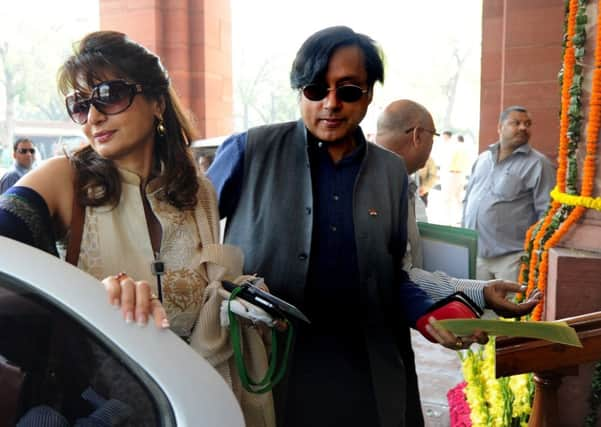India: Minister at odds with politics of common man


A magistrate who conducted an inquest has ordered police to investigate the death of Mr Tharoor’s wife, Sunanda Pushkar. She died on Friday just days after she accessed his Twitter account to accuse him of adultery with a Pakistani journalist and getting into a public spat with the woman.
An autopsy has found that Ms Pushkar most likely died of an overdose of anti-depressant drugs.
Advertisement
Hide AdAdvertisement
Hide AdLondon-born Mr Tharoor, has asked authorities to speedily conclude investigations, saying he was “horrified” by media speculation about him and his wife. The widely published photographs of a distraught Mr Tharoor after his wife’s funeral are in stark contrast to years of media coverage of the well-dressed, former high-flying diplomat.
A prolific author and one of India’s first major tweeting politicians, the US-educated MP and the beautiful Kashmiri who became his third wife were regulars in the social pages.
Media accounts of Ms Pushkar’s last days, spiced by the involvement of a journalist from the country’s old foe, Pakistan, have gripped the country over the past week.
The tale of one of the wealthiest figures in government has coincided with the growing prominence of politicians who have emphasised their less- privileged roots. Anti-corruption leader Arvind Kejriwal, a former tax civil servant who leads the Common Man’s Party and eschews VIP privileges such as official cars, and Hindu nationalist Narendra Modi, touting himself as the son of a tea stall owner, are now dominating as a general election approaches.
“This is the era of the rise of the common man, the tea seller,” said Sagarika Ghose, deputy editor of CNN-IBN and a leading Indian political commentator. “There is a sense that Tharoor is not what India is about these days.”
Mr Tharoor may survive politically. He has received backing from the leader of the ruling Congress party, Sonia Gandhi, and sympathy from many politicians.
“There’s a tendency to caricature Tharoor. He’s glamorous, in gossip columns, a fashion statement,” said Mr Ghose. “But he is also a very intelligent man and talented politician.”
Mr Tharoor left India as a student and, after nearly three decades at the United Nations, he returned to join local politics when he lost to Ban Ki-moon in the race for the position of secretary-general in 2006.
Advertisement
Hide AdAdvertisement
Hide AdHe made his mark quickly, becoming one of the first Indian politicians to harness social media.
But Mr Tharoor has had his share of problems. As a junior foreign minister, his political career almost ended after he tweeted that he would fly “cattle class” in solidarity with “holy cows” – sparking a storm of criticism from the country’s Hindu majority, for whom the cow is sacred.
In 2010, he resigned over allegations concerning a multi- million-pound cricket league franchise bid.
Mr Tharoor returned to the council of ministers two years later and is now the minister for human resource development.